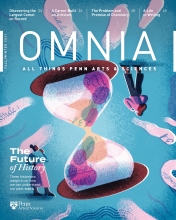When Democracy Arrives Undressed
Kira Wang, C’24, spent her summer unveiling how many naked ballots were invalidated in the 2020 General Election in Pennsylvania.
The 2020 General Election occurred against the backdrop of an international pandemic, resulting in unprecedented numbers of mail-in ballots. In Pennsylvania, mail-in ballots should arrive in a secrecy envelope enclosed in another return envelope. In September 2020, the Pennsylvania Supreme Court ruled that any mail-in ballots that arrive “naked”—without a secrecy envelope—must be completely discarded by election officials, leading to concerns about voter suppression.
Kira Wang, C’24, spent summer 2021 helping Marc Meredith, Associate Professor of Political Science, investigate how many naked ballots were received in each Pennsylvania county. Her research was supported by a fellowship with the Penn Program on Opinion Research and Election Studies (PORES), which pairs Penn undergraduate students with faculty who are conducting research on political outcomes in the United States using public opinion and election-related data.
“There was a lot of concern in the state that hundreds of thousands of ballots might be discarded because they arrived naked, to the extent that there were massive outreach campaigns to educate voters about the importance of making sure they used the envelopes correctly,” says Wang, who is passionate about preventing voter suppression.
To help ascertain just how many mail-in ballots were invalidated due to arriving naked, Wang conducted outreach to all 67 counties to collect the essential data. She also had the opportunity to explicitly connect her two majors—political science and computer science—when asked to create data graphs in R, a programming language, to illuminate some of the data findings.
“My majors are often seen as a weird combination. There isn't much overlap in terms of curriculum between them. However, working with PORES allowed me to see firsthand the intersection between coding and political science. It showed me how coding can inform quantitative political science research and how important that research is to the field,” explains Wang.
What most surprised Wang about her research experience wasn’t the number of naked ballots, which, though still being counted, look to be fewer than feared—but how decentralized county governments appeared.
“I was shocked that there was no standard way for counties to keep track of their election data or even to run their elections,” she says. “Some counties told us they didn’t collect the data on naked ballots, while it should have been clear from the Supreme Court decision that the information was important to collect. Different counties had different responses to our questions and different understandings of the ruling. It was really interesting to see that election processes may not always be the well-oiled machines we expect.”
In fact, the research showed that only 32 of the 55 counties who responded to survey outreach could provide exact information on the number of naked ballots received. The total number of naked ballots may never be known.
In addition to her naked ballot research, Wang assisted on another project related to election administrator turnover rates. She administered and oversaw data collection, conducted data cleaning processes, and coordinated the construction of new datasets in multiple coding languages and programs.
Wang has long been interested in issues of civic engagement and voter rights. In high school, she interned for her local congressperson, helping constituents get information about and access to social services, and she helped encourage young people to register to vote.
“I believe that voting is the most actionable thing you can do as an individual, whether interested in politics or not, to make things better for people who are worse off than you,” she says.




